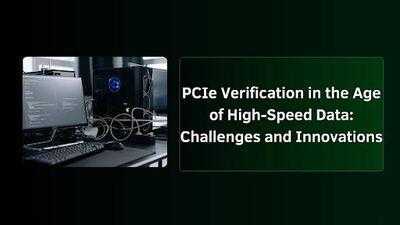

In today's digital landscape, the rapid evolution of is driven by the increasing demands of AI, cloud computing, and high-performance workloads. With PCIe 6.0 and 7.0 pushing data transfer speeds to 128 GT/s per lane, this advancement introduces significant challenges in signal integrity, power efficiency, and system reliability. Deepak Kumar Lnu, Principal Engineer, delves into critical verification challenges and innovative testing methodologies that are shaping the future of high-speed computing.
Why PCIe Verification is More Critical Than Ever
With rising PCIe data rates, verification is increasingly complex. PCIe 7.0 faces challenges like signal degradation, error resilience, and power efficiency at extreme speeds. Advanced simulation, compliance testing, and formal verification are crucial to ensuring reliability, especially for HPC, automotive, and AI workloads, where precision and stability are paramount.
Key Innovations in High-Speed Signaling
PCIe's transition from NRZ to PAM4 doubles data rate per clock cycle but introduces signal integrity challenges. Engineers address these with:
✔ Advanced equalization for signal loss compensation.
✔ Adaptive error correction for data integrity.
✔ Noise filtering for reliable transmission.
These ensure PCIe's high-speed performance.
Forward Error Correction (FEC): A Necessity for High-Speed Data Integrity
As transmission speeds increase, so does the likelihood of data corruption. To counteract this, Forward Error Correction (FEC) has become an essential part of PCIe 6.0 and 7.0.
✔ FEC significantly reduces bit error rates, maintaining data integrity even in noisy environments.
✔ However, its implementation introduces latency and computational overhead, requiring efficient optimization strategies such as adaptive coding and hardware acceleration.
Balancing error correction efficiency and processing speed is a key focus in next-generation PCIe verification.
Flow Control Units (FLITs): Standardizing Data Transfer
PCIe 6.0 replaces variable-length packets with fixed-size Flow Control Units (FLITs), enhancing performance and predictability. However, this complicates verification, demanding rigorous testing of sequence tracking, retries, and protocol handling to prevent data loss, latency spikes, and inefficiencies in high-performance computing.
Power Efficiency & PCIe's L0p Low-Power State
As computing power scales, so does energy consumption. PCIe's L0p low-power state optimizes power usage during idle periods without compromising performance.
✔ However, seamless transitions between power states must be rigorously verified to ensure stability and efficiency.
✔ Power-aware verification strategies help prevent unexpected power disruptions, particularly in battery-sensitive applications like mobile devices and automotive AI.
These enhancements make PCIe more adaptable for future computing needs while maintaining energy efficiency.
AI & Machine Learning in PCIe Verification
Artificial Intelligence (AI) and Machine Learning (ML) are transforming PCIe verification, helping engineers manage growing complexity in high-speed interconnects.
✔ AI-driven test generation and predictive analytics enhance bug detection and verification coverage.
✔ Automated debugging algorithms significantly reduce verification cycles, accelerating time-to-market for PCIe implementations.
These AI-driven solutions ensure next-gen PCIe verification is faster, more accurate, and highly scalable.
What Lies Ahead: The Future of PCIe Verification
As PCIe technology continues to evolve, verification methodologies must also advance at the same pace. Future innovations include:
✔ Real-time adaptive verification environments for faster debugging and compliance testing.
✔ Predictive analytics to anticipate and correct potential failures before they occur.
✔ AI-driven automated verification frameworks for seamless integration with emerging technologies.
These advancements will ensure PCIe remains the backbone of next-generation AI computing, high-performance data centers, and autonomous systems.
In conclusion, Deepak Kumar Lnu's research highlights the growing complexities of PCIe verification and the critical need for advanced testing methodologies. As AI-driven verification and signal integrity optimizations continue to evolve, the future of PCIe technology will be defined by efficiency, reliability, and scalability. With innovative verification strategies, engineers can ensure that PCIe remains at the forefront of high-speed computing and AI-driven workloads for years to come.